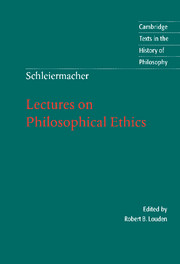Book contents
- Frontmatter
- Contents
- Introduction
- Chronology
- Further reading
- Note on the text
- Translator's note
- Lectures on Philosophical Ethics
- Ethics 1812/13: Introduction and doctrine of goods
- Ethics 1812/13: Doctrine of virtue and doctrine of duties
- Introduction, final version (probably 1816/17)
- Doctrine of goods, final version (probably 1816/17)
- Doctrine of duties, final version (probably 1814/17)
- Index
Doctrine of duties, final version (probably 1814/17)
Published online by Cambridge University Press: 05 June 2012
- Frontmatter
- Contents
- Introduction
- Chronology
- Further reading
- Note on the text
- Translator's note
- Lectures on Philosophical Ethics
- Ethics 1812/13: Introduction and doctrine of goods
- Ethics 1812/13: Doctrine of virtue and doctrine of duties
- Introduction, final version (probably 1816/17)
- Doctrine of goods, final version (probably 1816/17)
- Doctrine of duties, final version (probably 1814/17)
- Index
Summary
Introduction
1 The doctrine of duties cannot document the totality of movement, but only the system of consciousness in which they are absorbed.
Otherwise it would be history.
2 The doctrine of duties is positioned between the other two in such a way that action in accordance with duty presupposes virtue and sets conditions on the highest good, but conversely, in the same way, it presupposes the highest good and sets conditions on virtue.
As a doctrine, however, the doctrine of duties must remain independent of the other two depictions.
3 All action in accordance with duty is thus imperfect as such, because it is positioned right in the middle between two ways of shaping virtue and the highest good.
Because, that is, the second thing that comes into being through action is something that had not previously been in existence. – Imperfection, however, must lie with the terminus a quo as such, and not with the terminus ad quem.
4 Duty is therefore rectification and production.
Either separately, so that it divides along these lines, or so that each is present in the other.
5 Duty is not autonomous movement on the part of reason; on the contrary, reason is the moving [force] and nature that which is moved.
For no natural formation could come into being as the result of an autonomous movement of reason. Reason is not something we know in isolation, moreover, but only in nature.
6 Thus we cannot describe it solely in terms of cause, nor solely in terms of effect, but only in terms of the interaction of the two.
- Type
- Chapter
- Information
- Schleiermacher: Lectures on Philosophical Ethics , pp. 221 - 242Publisher: Cambridge University PressPrint publication year: 2002

